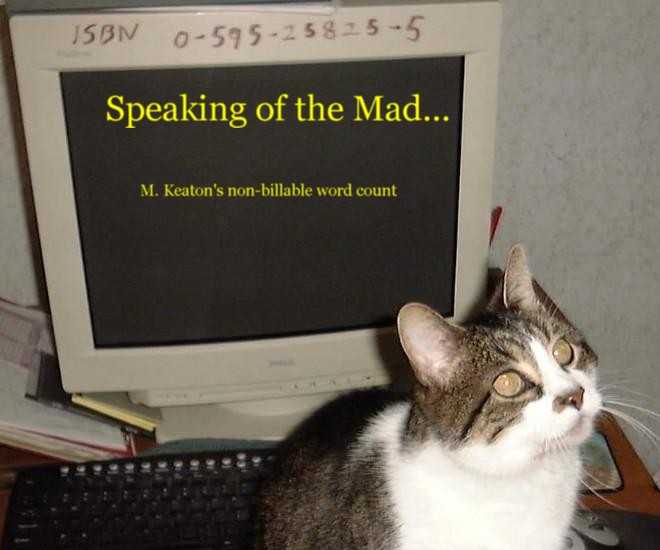If you missed the Sunday morning panel with Kelly and myself discussing the monomythic arc, that's too bad because I can't even begin to sum it all up here. It was one of those panels that really should have been recorded for SF oral history. Let's just say that for two tired guys tackling big words in the morning, we rocked. Well, Kelly did and I think I held my own.
The other big panel of my Sunday was Lost Birthright discussing the future of space travel and have we lost the will to make the sacrifices necessary to get to the stars.
Which actually begins with a panel on Saturday.
The panel on skepticism went about like I was afraid it would. Please don't misunderstand. I'm glad I did it and both everyone on the panel and in the audience were polite, courteous, and well-intentioned. Perhaps in a future set of posts I'll talk about my own problems with the skeptical movement but not now because I don't want to tarnish the panel. It was a good panel, well-received I think, and much less rancorous than I expected. In short, we spent an hour defining terms and debating several facets of the underlying philosophy of science. THAT was why I was disappointed. If we had the panel again next year, we'd have to cover the same ground all over again. The rhetoric and presuppositions of the skeptical movement and extreme believers are so deeply entrenched that, by the time you clear away the deadwood, you're out of time. It is effectively impossible to make any real headway on the philosophical debate. We were also supposed to be talking about the effect of a culture of extreme skepticism on SF literature but, of course, we ran out of time. Still, everyone did a masterful job of being open-minded and keeping focused on the topic while not allowing the discussion to bog down on any single issue.
I have to do a source-dump and clarify a few things because we covered a LOT of ground quickly. So (deep breath):
Names and references that you can do a quick google for if you're interested: Karl Popper (philosophy of science, esp. the need for a falsibility clause), Rupert Sheldrake (biomorphic or morphogenetic field theory and the sense of being stared at. Read his book on the experiments that could change the world if nothing else.), the Millikin effect (how to lie about your data, win a nobel prize, and then watch as it takes the entire world almost a century to figure out that you were wrong about the charge of an electron. It's late, I may have spelled Millikin wrong. The "effect" is how, even though other labs were reproducing his experiments, they unconsciously massaged their data to match his flawed results.), statistical meta-analysis (despite what some panel members said, it is one of the absolute best methods of handling large data sets), and finally, global warming and the University of Edinburgh (they faked a lot of stuff then when they were caught, destroyed all the raw data so they couldn't be held accountable. Obviously, other people hold more forgiving opinions than I do so you should look it up for yourself if you're interested. If you're interested in global warming specifically look up a fellow named Monkton. The Edinburgh case has less to do with global warming and more to do with the dangerous overlap of science, politics, and social pressure. This site has a lot of nice links on the subject including links to some of the actual recovered emails. http://www.bibliotecapleyades.net/ciencia/ciencia_globalwarmingpseudo47.htm)
If there's something else you remember we talked about but you don't remember the specifics, drop me a note with what you can recall and I'll try to see if I remember it. Let me also take a moment to thank the audience member who allowed me to clarify my statement about the UofE and point out that it was not about their science but about their behavior.
(gasp for air)
At the end of the panel, after discussing all the various problems and risks involved in research and how to be properly skeptical without being reductionistic, I asked what could be done. The consensus was that we should spend more money on science education in schools and focus our public research monies on subjects that would pay off in the short term. Okay, I don't agree; I'm certain you're shocked. But, this (finally) is why I link this Saturday panel with Sunday.
Lost Birthright had, to my surprise, only one presenter in common with the skeptic panel (myself) and, that I could see, no audience overlap. It was like the two panels had taken place on different worlds. Both panels were serious with intensely held positions but where the skeptical panel had been somber and dismissive, the Birthright panel was bright and loud and enthusiastic and optimistic. And the conclusions were polar opposites. The Birthright panelists were united on a common theme: we need to push the envelope and we need to think and plan long term.
I'm not trying to cast aspersions on anyone from either panel. What I am trying to do is explain the two completely different mindsets at work. I went from a panel that said "color inside the lines and focus on the short term" to a panel that said "dream big and plan long." The juxtaposition was startling. I don't know what, if anything, to make of it. I do wish there had been some other overlapping people so I could ask if I was the only one struck by the difference. In fairness, it might have been that the topics themselves set the tone of the discussion or it might be that 4pm Saturday panels have a different mindset than Sunday morning. I don't know. It was interesting to me though so I thought I'd share it.
Oh, and then there were long goodbyes and everyone went home safely without any other details because this post is way too long.
Friday, November 21, 2014
Subscribe to:
Post Comments (Atom)





















No comments:
Post a Comment